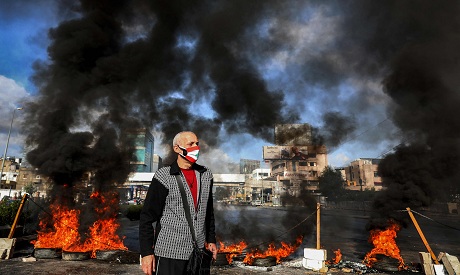
A man clad in mask depicting the Lebanese flag stands next to flaming tires at a make-shift roadblock set-up by anti-government demonstrators in the area of Dora on the northern outskirts of Lebanon's capital Beirut on March 8, 2021 during a protest against the deteriorating value of the local currency and dire economic and social conditions. (Photo by / AFP)
Demonstrators blocked key roads across Lebanon on Monday in protest at the country's political paralysis after the Lebanese pound hit record lows on the black market.
Black smoke billowed up from overturned rubbish dumpsters and tyres set ablaze by protesters at various entrances to Beirut from the early morning.
Lebanon is in the grips of its worst economic crisis in decades, compounded by the coronavirus pandemic.
The value of the Lebanese pound has plunged by more than 80 percent, sending pricing soaring, and more than half the population are living below the poverty line.
"We've closed off all the roads today to tell everyone: It's over, we have nothing left to lose. We've even lost our dignity," said Pascale Nohra, a protester blocking the northern road into Beirut.
She said it was time to revive the mass cross-sectarian protests of late 2019 against the political class.
"We want everybody to show solidarity and come out on the street to demand their rights. The economic crisis touches all Lebanese and religious sects," said the former worker in real estate.
"We need to return to the streets and revive our revolution," she said.
The value of the local currency has hovered at an all-time high of nearly 11,000 pounds to the greenback on the black market in recent days, even though the official exchange rate remains 1,507.
Lebanese fear the government will soon lift food subsidies, and footage has circulated of fighting over cheaper, subsidised baby milk in a supermarket.
Mohammad Faour, a research fellow in banking and finance at University College Dublin, said the pound's ongoing free fall was "a mere continuation of a clear downward trend in the exchange rate since the very beginning of the crisis, and the concurrent policy inaction".
The protests came on the same day as Lebanon entered a new phase in easing up a lockdown to keep Covid-19 infection rates in check.
Lebanon has been without a fully functioning government since a massive blast in Beirut last summer than killed more than 200 people and ravaged swathes of the capital.
The government stepped down after the disaster, but a deeply divided political class has since failed to agree on a new cabinet to replace it.
Short link: